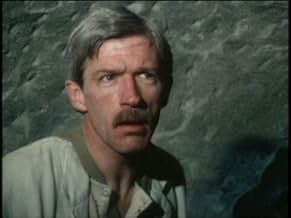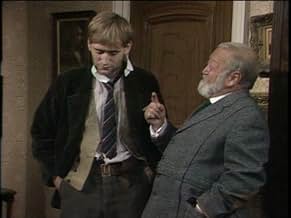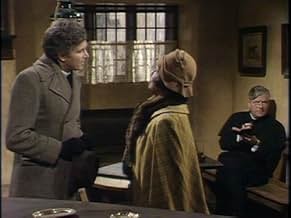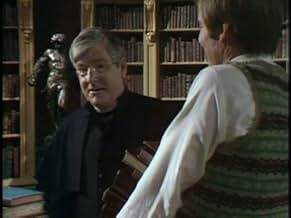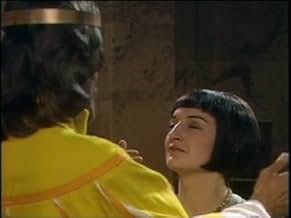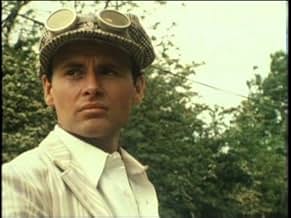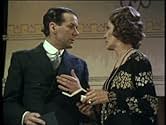Füge eine Handlung in deiner Sprache hinzuBased on the stories of G.K. Chesterton, a British Catholic Priest solves mysteries.Based on the stories of G.K. Chesterton, a British Catholic Priest solves mysteries.Based on the stories of G.K. Chesterton, a British Catholic Priest solves mysteries.
Folgen durchsuchen
Empfohlene Bewertungen
Interesting adaptation of Chestertons popular creation. the series looks its age now but is more faithful to the original books than the current BBC version.
I have had this series in my archive for a number of years now and was moved to re-watch it agin after the finale of the 7th series of the current Mark Williams led series last week.
Kenneth More was a fine actor and played Father Brown much closer to the book version than either Alec Guinness or Mark Williams. Less humourous than the other adaptations but still very entertining especially for fans of period dramas.
Recommended
Recommended
G. K. Chesterton wrote after Conan Doyle invented Sherlock Holmes but (mostly) before Agatha Christie's reign. His detective Father Brown is an inoffensive little priest who knows a lot about crime, from years of hearing confessions. So he can see what others can't.
Here's an example (and since this story wasn't in the series it's not a spoiler). A headless man is found. His house is scattered with snuff; with clockwork like destroyed toys of the period; and with other bizarre things.
Father Brown (I won't give away how) figures out that the man left everything in the Will is scrupulously honest. He was left all the man's "gold." So he takes the man's collection of gold snuff boxes but not the snuff; he takes the man's gold watch-cases but not the watches; and as for beheading the man, since he was dead anyway it was easier to remove the man's gold teeth.
Chesterton's stories are less who-dun-its than puzzles to be solved. And they may have a theological point. Often this is said it's because Chesterton was such a strong Catholic, but his conversion to Catholicism came after he'd created Father Brown and had written most of his stories.
Whether Father Brown's stories could make a viable series like Brett's "Sherlock Holmes" or Suchet's "Poirot" or Hickson's "Miss Marple" is debatable. Some of Chesterton's Father Brown stories (which I love) are great while others are slight to plump out an hour apiece. And since Chesterton liked to serve everything up with a taste of humor he's often presented as a silly rather than a serous writer. Serious writers, it seems, shouldn't have a sense of humor. Baloney.
(Forget the Mark Williams reboot; all it has in common with Chesterton's stories is the main title).
This series has some poor production values and acting. Even the great Kenneth More appears miscast as Father Brown. A fine actor, More's performances have always been of characters who are sharp and smart, not low-key characters who appear silly on the outside, even if they are cleverer than everyone else on the inside. I've always appreciated Kenneth More's acting, but he's not that good at hiding his light under a bushel the Father Brown way.
When I first caught this in high school (fifteen years before I cared to read Chesterton, now one if my favorite authors) I was accustomed to British TV presentation with great actors performing in long takes on videotape on cheap-looking sets and with outdoors scenes on grainy film. Nowadays I'm more accustomed to slicker productions where the actors practically whisper. So the series looks old and creaky. Too bad. Chesterton deserves better.
Here's an example (and since this story wasn't in the series it's not a spoiler). A headless man is found. His house is scattered with snuff; with clockwork like destroyed toys of the period; and with other bizarre things.
Father Brown (I won't give away how) figures out that the man left everything in the Will is scrupulously honest. He was left all the man's "gold." So he takes the man's collection of gold snuff boxes but not the snuff; he takes the man's gold watch-cases but not the watches; and as for beheading the man, since he was dead anyway it was easier to remove the man's gold teeth.
Chesterton's stories are less who-dun-its than puzzles to be solved. And they may have a theological point. Often this is said it's because Chesterton was such a strong Catholic, but his conversion to Catholicism came after he'd created Father Brown and had written most of his stories.
Whether Father Brown's stories could make a viable series like Brett's "Sherlock Holmes" or Suchet's "Poirot" or Hickson's "Miss Marple" is debatable. Some of Chesterton's Father Brown stories (which I love) are great while others are slight to plump out an hour apiece. And since Chesterton liked to serve everything up with a taste of humor he's often presented as a silly rather than a serous writer. Serious writers, it seems, shouldn't have a sense of humor. Baloney.
(Forget the Mark Williams reboot; all it has in common with Chesterton's stories is the main title).
This series has some poor production values and acting. Even the great Kenneth More appears miscast as Father Brown. A fine actor, More's performances have always been of characters who are sharp and smart, not low-key characters who appear silly on the outside, even if they are cleverer than everyone else on the inside. I've always appreciated Kenneth More's acting, but he's not that good at hiding his light under a bushel the Father Brown way.
When I first caught this in high school (fifteen years before I cared to read Chesterton, now one if my favorite authors) I was accustomed to British TV presentation with great actors performing in long takes on videotape on cheap-looking sets and with outdoors scenes on grainy film. Nowadays I'm more accustomed to slicker productions where the actors practically whisper. So the series looks old and creaky. Too bad. Chesterton deserves better.
These TV series are poorly made. I do not mean the technical side, with respect to age of the series and TV format it could be considered satisfiable.
I mean, actors' playing is bad almost for all of them. Sometimes the plot lines are vague and characters are unbelievable.
May be, one of the strong sides is that acting doesn't always look like theatrical performance. We get some interesting views and interiors.
I am not a good reader, so I've considered to watch this version. And I've got nothing. I couldn't assemble the plot, I can't understand the clerical point of view, I do not believe in acting. Just a few personal features and authors statements are well pronounced.
I wouldn't keep this historical TV production in my archive.
I mean, actors' playing is bad almost for all of them. Sometimes the plot lines are vague and characters are unbelievable.
May be, one of the strong sides is that acting doesn't always look like theatrical performance. We get some interesting views and interiors.
I am not a good reader, so I've considered to watch this version. And I've got nothing. I couldn't assemble the plot, I can't understand the clerical point of view, I do not believe in acting. Just a few personal features and authors statements are well pronounced.
I wouldn't keep this historical TV production in my archive.
The 1974 version of G. K. Chesterson's Father Brown is chef's kiss aesthetically and intellectually. I have seen a few episodes of the 2000s remake, which is brightly lit and has a certain middle class sensibility compared to the mysterious darkness of this series, and that 21st century revamp is flat, bland and twee - like it was literally dumbed down for Americans. The 1970s original is magnificent BBC drama, replete with claustrophobic smoking parlours, be-wigged barristers in stuffy court rooms and delightful ornate antique light fixtures.
The Father Dowling Mysteries were an Americanized and modernized attempt at the original 1920s Chesterson books, and are for all intents and purposes absolute moronic trash in comparison (unless you were eight years old in 1989).
But this THIS is art and I am delighted that numerous episodes are available on streaming. Highly recommended to serious mystery fans.
The Father Dowling Mysteries were an Americanized and modernized attempt at the original 1920s Chesterson books, and are for all intents and purposes absolute moronic trash in comparison (unless you were eight years old in 1989).
But this THIS is art and I am delighted that numerous episodes are available on streaming. Highly recommended to serious mystery fans.
I've been listening to the BBC radio adaptations of the Father Brown stories with Andrew Sachs in the lead role. I have to say I much prefer Sachs' version of Father Brown, but this series is perfectly good with Kenneth More in the role. Considering when the series was made, the production is reasonably good, and the acting, while occasionally stiff, is fine overall. Some changes are made from the stories, which I have no problem with. Of the episodes I've seen so far, none have been damaged by the changes. It is important that Father Brown is a Catholic priest, and not just another amateur detective, and in this sense some of the religious reference seem to have been taken out of the stories. This subtracts from the distinctive flavor of the stories, but it plays fine on television.
You won't get the production values or the acting found in the later Christie series, but these are well worth trying if you favor British detective/mystery series. I'm certainly happy I found them, and I'll be watching them one per night until I've through the lot.
You won't get the production values or the acting found in the later Christie series, but these are well worth trying if you favor British detective/mystery series. I'm certainly happy I found them, and I'll be watching them one per night until I've through the lot.
Wusstest du schon
- WissenswertesThe series was rebooted in 2013 with Mark Williams as Father Brown.
- VerbindungenRemade as Father Brown (2013)
Top-Auswahl
Melde dich zum Bewerten an und greife auf die Watchlist für personalisierte Empfehlungen zu.
- How many seasons does Father Brown have?Powered by Alexa
Details
Zu dieser Seite beitragen
Bearbeitung vorschlagen oder fehlenden Inhalt hinzufügen







